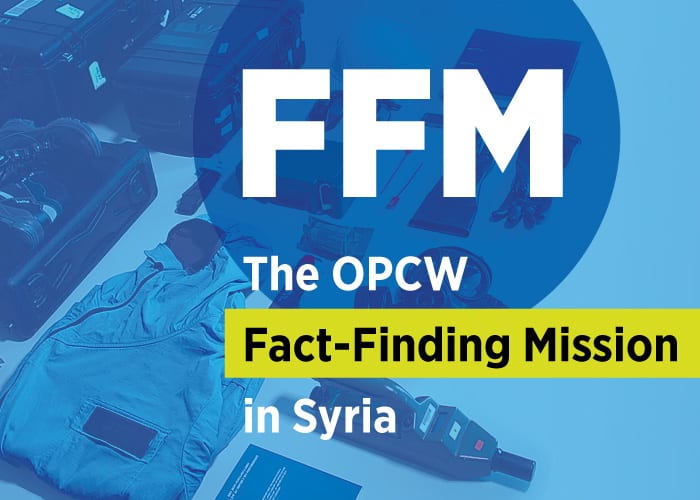The Fact-Finding Mission (FFM) team of the Organisation for the Prohibition of Chemical Weapons (OPCW) visited one of the sites in Douma, Syria today to collect samples for analysis in connection with allegations of chemical weapons use on 7 April 2018.
In the two weeks since the Syrian city of Douma was struck by a suspected chemical weapons attack, the area has been visited by Russian military police, the Syrian army, and then journalists.
The FFM team had arrived in Damascus last weekend to examine the site but faced several days of delays after an advance security detail was fired upon on Tuesday. Suspicions grew among local residents and Western governments that Syrian and Russian authorities were attempting to interfere with the investigation.
The samples collected will be transported to the OPCW Laboratory in Rijswijk and then dispatched for analysis to the OPCW’s designated labs. Based on the analysis of the sample results as well other information and materials collected by the team, the FFM will compile their report for submission to the States Parties to the Chemical Weapons Convention for their consideration.
The OPCW will evaluate the situation and consider future steps including another possible visit to Douma.
Alastair W.M. Hay, a toxicologist and professor at the University of Leeds, told the Washington Post that chlorine was likely to have vanished from the site and that any traces found in the biomedical samples of victims were likely to be inconclusive because chlorine appears naturally in the body.
Remnants of a nerve agent also would be increasingly difficult to find, he said, although they could be detectable in the samples of living victims or exhumed bodies.
On Thursday, the United States said it had credible information to suggest that Syria and Russia were working to delay the OPCW mission to Douma as their forces removed evidence that a chemical attack had taken place.
“Russian officials have worked with the Syrian regime, we believe, to sanitize the locations of the suspected attacks and remove incriminating evidence of chemical weapons use,” said Heather Nauert, spokeswoman for the State Department.
Read more:
- Chemical Weapons Watchdog – Inspectors Have Samples From Douma (Reuters)
- Chemical Weapons Coverup Suspected in Syria as Iinspectors Remain Bblocked (WaPo)
- Methodology: How We Tracked the Illegal Shipment of Sarin Precursor from Belgium to Syria (Bellingcat)
- Syria Chemical Attack: Sinking Deeper Into the Chemical Warfare Abyss (Amazon)
- Podcast: Are Nerve Agents Out of Control? (BBC)


